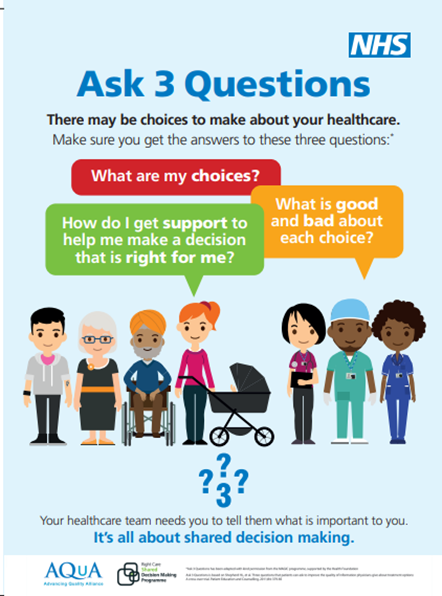Shared decision making high risk clinic
What is shared decision making?
Shared decision making (SDM) is a joint process where a healthcare professional supports a patient to reach a decision about their care or treatment.
It aims to help you to choose tests and treatments based on:
- medical evidence
- your individual preferences, beliefs and values.
It makes sure you understand the risks, benefits and possible consequences of different options through discussion and information sharing.
Research has shown that people find they are happier with their care and are more likely to stick with their treatment or care plans when they are jointly involved in decisions about their treatment.
Shared decision making isn’t just about reviewing specific surgical options, but also taking into consideration alternative options such as medical treatments or doing nothing at all to understand the impacts of each of these.
Why have I been asked to attend a shared decision-making appointment?
If your surgeon, doctor or specific investigations suggest that you are at high risk of complications from having surgery, we will invite you to attend a shared decision-making appointment.
What should I expect in my appointment?
You will see a consultant anaesthetist and have an in-depth discussion about the risks and benefits of each treatment choice and what matters most to you.
The aim of this clinic is to discuss your health, chronic medical conditions and lifestyle to support the best treatment option for you. We will help you to make an informed choice on whether surgery is the right option for you.
If you decide to go ahead with surgery, we will agree a plan with you to make sure that you are in the best condition for your surgery.
You may wish to bring a family member with you to the appointment.
Questionnaires
Before and immediately after your appointment, you will be asked to fill out some short questionnaires about how you are feeling and if you think that the appointment and information you received was helpful. Your responses will help us improve our service.
Before you see your healthcare professional
Write down any questions you want to ask.
Think about what you want to get out of your care and goals for treatment. These may include:
- improving symptoms
- taking fewer medications
- increasing your activity levels
- length of life vs quality of life.
If you need any additional support such as an interpreter, please let us know before your appointment.
During your consultation
Write things down if needed to help you remember what has been discussed. Tell your healthcare professional:
- what you would like to speak to them about
- if you need more information or if there is something you don’t understand
- if you need information in a different format, such as large print, or if you need someone to help you understand what is being said.
You can ask for written explanations if you find it difficult to understand medical words.
Ask 3 questions
The Ask 3 questions campaign encourages shared decision making by reminding patients to consider three simple questions when making decisions about their healthcare.
- What are my choices?
- What is good and bad about each choice?
- How do I get support to help me make a decision that is right for me?

Contact us
You can call us on 023 8120 5469 or email POCdigitalsupport@uhs.nhs.uk.